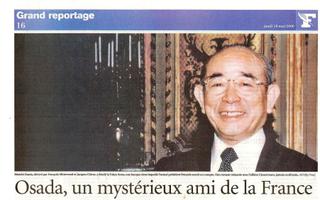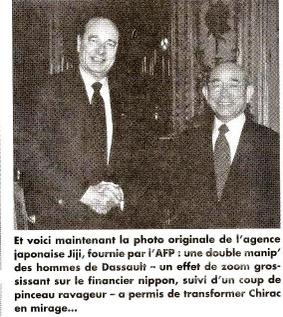

Tokyo Sowa Bank : A legacy of disgrace
-Feuilletage (in English)
Jacques Chirac was a friend of Shoichi Osada, boss of the
defunct Tokyo Sowa Bank, but he would prefer to forget
him now that the banker has returned to haunt him in the
Clearstream affair. According to a subplot leaking from
France's present political scandal, Chirac was suspected
in the past of holding a well-stocked account at the Sowa
bank. The establishment crashed in 1999, landing Osada
with a suspended jail sentence.
When Figaro needed a picture of the banker for a report
this week, it picked one of him in a handshake with his
friend in the presidential office at the Elysée palace in
1995. Loath to cause offence, the newspaper took Chirac
out of the picture, not just cropping it, but blacking
him out and disguising the Elysée décor. The wheeze was
rumbled by Le Canard Enchaîné, which hardly needed to
remind readers that Figaro is owned by Serge Dassault of
the aircraft and armament firm, a close Chirac ally...
Nicolas Beytout, Figaro's editor, explained to Le Canard,
that the original picture featuring Chirac could have
"misled readers because it did not correspond to the
content of the article." Chirac, an admirer of Japanese
culture who has made dozens of trips to Japan and who
promoted Osada from chevalier to officier de la Légion
d'Honneur, strongly denies ever holding a bank account in
Japan.
-La presse et les blogs sur l'affaire Osada, "l'ami
banquier de Chirac" selon le Canard Enchaine.
"L'ex-PDG de la banque japonaise Tokyo Sowa Bank,
récemment évoquée en marge de l'affaire Clearstream, a
été condamné jeudi 25 mai 2006 à Tokyo à verser à son
ancienne société 18,9 milliards de yens (135 millions
d'euros) correspondant à une fausse augmentation de
capital dans les années 1990. L'ex-banquier et 17 autres
anciens cadres de la Tokyo Sowa Bank, traduits en justice
par les liquidateurs de la banque, ont été condamnés à
rembourser le montant d'opérations illégales réalisées en
1997 et 1998. A l'époque, la TSB, en grande difficulté
et croûlant sous les mauvaises créances, peinait à
remplir son obligation légale consistant à avoir un
coefficient de suffisance de capital supérieur ou égal à
4%. Ce ratio des actifs sur les capitaux mesure la
vigueur financière d'une banque et son risque de
faillite. C'est pourquoi les gouvernements imposent
toujours aux institutions financières de détenir un
capital minimum, équivalant à un certain pourcentage de
leur actif. Souhaitant effectuer une augmentation de
capital pour éviter la banqueroute, mais incapables de
trouver des souscripteurs, les dirigeants de la Tokyo
Sowa Bank avaient fait acheter les nouvelles actions par
des filiales de la banque, au moyen d'argent prêté par la
banque elle-même. Ils avaient par la suite maquillé les
comptes pour camoufler cette opération illégale, a
reconnu le tribunal de Tokyo." (Agences)
No comments:
Post a Comment
Be nice and informative when you post or comment.
Thank you to visit Asian Gazette Blog of Joel Legendre-Koizumi.